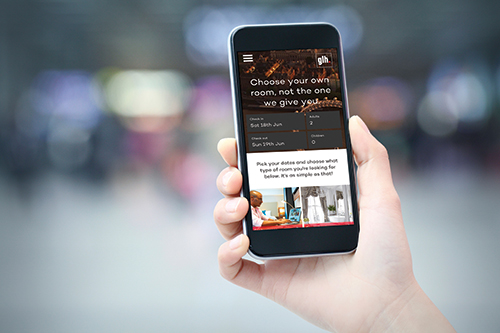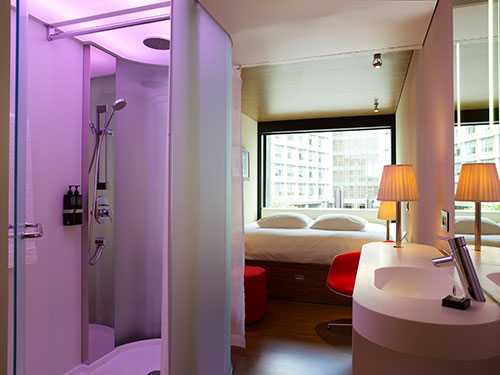How to generate direct hotel bookings
Online travel agents can be a great marketing tool, but there are ways to claw direct bookings back from intermediaries, says James Stagg
The first thing to bear in mind when trying to claw back control is not to throw the baby out with the bathwater. OTAs might take a mighty commission, but you'll be surprised how many guests who book directly with you first found your hotel through an intermediary.
Hotel management company GLH's customer, markets and strategy director Alastair Campbell has launched a number of initiatives to encourage guests to book direct, but he also recognises that for new business, sometimes an OTA is a necessary evil.
"Customers may start on Booking.com, but they try multiple websites before they complete their booking," he says. "If they look at your hotel on Booking.com, they will almost certainly look at your website and TripAdvisor. We don't want to out-shout OTAs on traffic, as there is no way we can do that and, ironically, they can be a source of traffic to your site."
Speaking at Triptease's Direct Booking Summit in June, Lennert de Jong, chief commercial officer at CitizenM, said a pragmatic and sophisticated approach was required. "What happens if you're getting a lot of traffic that originated with the OTAs being converted to a direct booking?" he asks. "Congratulations, your profit and loss will look great this month, but are you happy to jump out of the top 20 or 30 on Booking.com to position 150?"
Once a guest has found a hotel, whether it's through a direct search or inspired by an OTA hunt, it's vital to make sure that the experience is as seamless as that of an OTA and that the guest feels they are getting value. This means educating a consumer that has been repeatedly told that OTAs offer the cheapest price.
Marriott's senior e-commerce manager Chris Robinson, who also spoke at the Triptease summit, has been on a mission to redress the balance through the 'It Pays to Book Direct' campaign. "We did a small survey focusing on the millennial traveller and noticed that they prefer to book using OTAs by about two to one," he says. "The worrying thing is that, for Marriott, millennial travellers are worth around 76% of our room nights in the next four years. If we don't pay attention to what they want, we are behind the pack.
"We also found this myth that it's cheaper to book through OTAs, which is not the case and has never really been the case."
GLH's ‘choose your own room' technology
Word of mouth
When a customer does hit a hotel site direct, there is an element of reassurance required to ensure they stay and book and, according to Campbell, that's where review sites come in.
"Everyone in the hotel industry is worrying: am I a better intermediary than my competitor?" he says. "In the end, what we should be worrying about is how we make sure guests have a wonderful time when they stay in our hotels. In the TripAdvisor age, that's the way to get more business.
"We have found that, after price, a customer's number one criteria on choosing a hotel is review sites. The best thing you can do, therefore, is make sure that the people who have stayed and had a wonderful time review you. We have found the act of transforming your TripAdvisor ranking has an effect on the amount you can charge."
Campbell says the Amba Hotel Charing Cross has gone from the 220th hotel in London on TripAdvisor to number seven, and has dramatically improved its revpar as a result. This type of positive reinforcement will encourage a guest to check out a website, but they will only follow through with a booking if the experience is close to being as smooth as through an OTA.
"At Marriott, it's about ease of use," says Robinson. "If you can give people an experience through direct channels that they can't get with OTAs, that's when you start winning. What we're trying to do is make booking online exciting and provide that unique content and experience.
De Jong says: "Put yourself in the shoes of the customer: visit your own hotel website and ask yourself, 'would I go through Booking.com or am I going to spend some time on this website?' Think about things like dominant design and be ruthless. For example, why on earth would I tempt a user who can book a room on Booking.com in two seconds with a page where they have to get their credit card out of their pocket and enter their details?"
De Jong says that CitizenM saw a 20% drop-out rate when guests were asked for credit card details on its website, undermining its investment in display marketing and search engine marketing. As a result, it now asks for details after a guest has confirmed their stay.
Avvio's Frank Reeves believes these margins make the difference between a guest booking direct or going elsewhere. "Trial much of what the OTAs have been doing and be open to experimentation," he advises. "There's no 'one size fits all'. Online conversion is a science."
CitizenM London
Personal service
Reeves suggests that operators should use a personalisation engine to welcome back previous visitors to the website with a message relating to their latest enquiry. "Consider offering added value to encourage the booking," he says. "Ramp up the conversation based on upselling, cross-selling and loyalty."
Marriott's 'It Pays to Book Direct' campaign aims to generate this type of loyalty by including incentives whereby its rewards members are guaranteed a cheaper price than advertised elsewhere. Robinson says: "It's still early days to see if we've driven incremental new booking, but we've seen a definite increase in membership performance. We're making it easier for guests to enrol and book."
Meanwhile, Campbell has introduced 'choose your own room' technology at GLH, offering a real incentive to direct bookers and a clear point of difference from OTA sites. The technology interacts directly with a hotel's property management system, so it's an innovation that only an operator could implement.
"We're pretty confident we're the only people doing it right now," he says. "It's not something intermediaries can offer, so it falls into the category of a surprising benefit for a customer. It is a basic expectation that has, until now, been left unfulfilled."
And in essence, it all comes back to the experience. A hotel might be offering the smoothest and most impressive service in the property, but unless this is replicated online, direct bookings are unlikely to follow. Make personalisation meaningful and reap the rewards.
Make personalisation pay
When you've worked hard to get a customer to your site, a personal experience is likely to keep them there.
For GLH's Alastair Campbell, this focus on personalisation runs across the physical and the digital business. "Our improved rating on TripAdvisor has mainly come from warm, personal connections - being hospitable," he says. "We use digital interactions to improve that, so we have value centre relationship managers at the hotels who call most of our guests to make a personal connection."
GLH is trialling a service from Thunderhead that tracks a given customer's digital experience with a hotel - be that booking or interacting online during a stay - to better understand their habits and likes.
"You can use the behaviour of a customer to predict user intent on the website and help them to get what they want done faster and quicker," Campbell explains. "We move things around the website based on what they're doing, which massively increases the click-through rate."
When Marriott wanted to know what people were looking for from a hotel, it interrogated why a guest was staying. "We found many were staying because of local shopping and activities, but there was nothing to reflect that on the website," says Marriott's senior e-commerce manager Chris Robinson. "So content was built around that and out of the content came reviews."
Campbell agrees that it all boils down to advocacy, which encourages customers to book direct. "Customer engagement is not just about repeat business, it's about advocacy in an age where it drives business," he says.
How to optimise your bookings
Account management team lead Niamh Power and product specialist Lisa Callaghan of Avvio give us their top tips.
Educate the visitor that 'direct is best' and reinforce this message through the use of incentives. These should be relevant and of interest to the market in question. The message should be consistent throughout the journey of the visitor, from the first touch-point on the website right through to the confirmation page, and be supported by the hotel when the guest arrives. Campaigns can avoid becoming stale by being tweaked on an ongoing basis and targeting the market that requires the uplift.
??Highlight and promote your 'best rate guarantee', 'no deposit' and 'free cancellation' policies throughout the booking path so that there is no ambiguity for shoppers as to how in-line you are with the OTA pricing models. Integration with a price comparison tool like Triptease will also work in your favour to further emphasise this and avoid a user abandoning your site.
Hotels should be able to identify the revenue paths from the website through to the booking engine. This will help provide an insight into where shoppers are abandoning, and hotels can then react through the use of different features. It's about enticing the shopper to remain on the site by promoting the unique selling points of the hotel and the rate.
An active booking engine is crucial. Key sales features, such as strikethrough pricing, highlighting the number of rooms left and the time of the last booking coupled with the inclusion of custom sales messages has been proven to convert browsers by engaging the subconscious to highlight value and create a sense of urgency to complete the reservation.
Get personal! Personalise the customer experience by tracking various customer booking 'life cycle' events and tailor the behaviour of the booking engine based on where in the life cycle a customer is. This capability will allow for more meaningful and personalised engagement with prospective customers, including the ability to offer additional incentives, such as discounts to entice return visitors to complete their booking.













